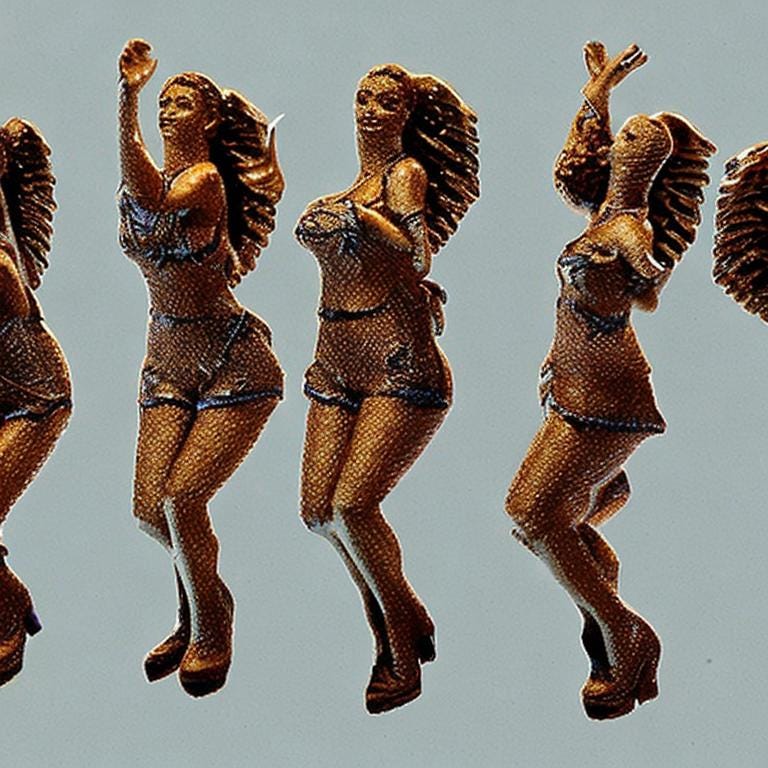Over at new work in philosophy substack I get exposed to current work from academic philosophers as the blog is used to re-publish, and thus highlight on a different platform, articles from more scholarly journals.
So recently I read Preston Werner’s (Hebrew University of Jerusalem), "Toward a Perceptual Solution to Epistemological Objections to Nonnaturalism" (Journal of Ethics and Social Philosophy, 2023).
Or tried to, it took me three or four days to get past the first line. Even the evolutionary science referred to herein is foreign to me. The world they inhabit is not one I can sense. It was harder than a gentoo linux installation which I am also failing to achieve within the same time frame this week.
If the moral urge /world building framework is correct then this entire article is arguing about whether the dancing angels are doing the can-can or gangnam style on top of the pin. And the writer’s intentions are good so I feel a bit abashed at my words here.
Maybe there is no pin ‘p’ though. For the angels of our words dance as we please, and displease us in turn.
My use of world, here ‘shown’ posed near to world-building, is influenced by the scientific method and metaphors involved in ideas of fitness landscapes, umwelt, niche construction etc. that are used to describe populations of individuals and their environments. It is a social ecology that concerns itself with three overlapping inter-operating realms of the social, the individual and the ecology, and recognises each of these three realms are fractal all the way down within/without. There are no magisteria in this view, supernatural or otherwise. (I think this is what the first line from the article (quoted below) might be getting at too…) —.

The analytical school of philosophy, or at last, the argumentative style, it would be better to generalise here, with it’s deep rigour of beliefs that proposition p, is, well, not useless… —but maybe we should just outsource those finagling models to our algorithmic extended phenotypes in AI, which procedurally extend beyond our own ability to recursively hold in mind a mechanical set of recursions, potentially meta-recursively towards incomplete uncertainty, unless something important emerges… to notice… —i.e. one gets lost in the maze mapped out by contentious rebuttals to ‘beliefs’ propositioning ‘p’.
As a possible neo-pyrrhonist this technical use of belief is abhorrent. Why? Because none of us live that way even if we believe we do. Even if/when we try. I guess it is a way to organise things, but really!?
I am not arguing (for/against) here the truth values any of that ‘p’-ing intends by the way.
The trouble I had with the first line:
“Nonnaturalist moral realism is the view that moral truths are objective, mind-independent, and not reducible to natural facts.” (link)
is that every single term here is annoying. I ask myself, what world are they living in? Is the lovely cat writing? Is Werner a pet? A proposition ‘p’.
This is unkind as you cannot see my kind smile as I type this… —so. Again.
The (moral urge / worldbuilding urge)plex is concerned with the survival of individuals of a population in an environment, and the urge each of us feels as an empathic member of that “population of individuals in an environment” who worries “what about the children?” that we each (psychopaths and narcissists likely excepted) feel directly as a moral world. But to see the outcomes of this process as “moral truths” confuses these outcomes with the advantage that comes simply with organising ourselves. We do not sense moral truths, they are the medium of our organisational skills when we should each other. This is not an exact science that can analytically proposition ‘p’ into belief “p++”. Which means, in some definitions of philosophy, it is not philosophy because I am not looking for truth outside of a (shared) objective reality ‘project’. But science is leading us that way (back) to fashion and of course, values, it is an axiological realm.
Also, or thus, such an urge-plex can be “reducible to natural facts.” So nonnaturalism is unecessary. See the why we should essay for my backgrounding why on this statement.
Of course, I am missing something in the article, I am mis-stepping, but I am organised, at least, I survive. So much for logic. And the epistemological incoherence??
The urge don’t care about it, and that is a moral sensibility I can access directly, or not.

Newer version at whyweshould.loofs-samorzewski.com




